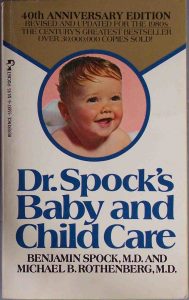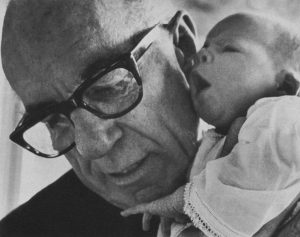1940s: Spock
Wikimedia contributors and Diana Lang
Benjamin Spock: A Child-Centered Approach

Benjamin Spock was the first American pediatrician to study psychoanalysis in an attempt to understand children’s needs and family dynamics.[1] His ideas about childcare significantly changed overall attitudes toward the rearing of infants and children via his book, The Common Sense Book of Baby and Child Care (1946), one of the best selling volumes in history. The book’s premises to parents are that “you know more than you think you do,” and if you “feel like comforting the child, do it.”[2] He encouraged parents to be more flexible and affectionate with their children and to treat them as individuals.
Spock’s first edition advised mothers to indulge their own impulses and as well as their children’s, assuring them on the basis of the latest scientific studies that it was safe to do so. In the process, the book changed child-rearing advice from the previous generation and authorized mothers to express their “natural” feelings toward their children. However, his theories were criticized by colleagues for relying too heavily on anecdotal evidence rather than academic research.[3] Spock recommended spontaneity, warmth, and a fair amount of fun for parents and children.

In subsequent editions of his book, Spock also included fathers in the contexts of childcare and child-rearing, acknowledged gender roles, and addressed divorce and single parenting.[4]
Overall, Spock’s advice encouraged caregivers to help children fit into the current needs of society and become contributing members of that society. He highly advocated for caregivers to instill values of cooperativeness and congeniality and help their child be likable. Spock was one of the most notable American authors of child-rearing advice during the twentieth century due to publications in contemporary, mainstream magazines.
Key Takeaways
- Parents should be adaptable, loving and encourage individuality within each child.
- Parents should have balanced relationships with their children composed of spontaneity, warmth, and fun.
- Parents should help children become contributing members of society by teaching cooperativeness and congeniality.
- The first American pediatrician to study psychoanalysis to understand children’s needs and family dynamics.
Further Reading
Spock, B., & Morgan, M. (1989). Spock on Spock: A memoir of growing up with the century. Pantheon.
Bloom, L. (1972). Doctor Spock: Biography of a conservative radical. Bobbs-Merrill.
Mitford, J. (1969). The trial of Dr. Spock, the Rev. William Sloane Coffin, Jr., Michael Ferber, Mitchell Goodman, and Marcus Raskin. Knopf.
Watson, J. B. (1928). Psychological care of infant and child. Norton.
Zuckerman, M. (1993). Doctor Spock: The confidence man. In Almost chosen people: Oblique biographies in the American grain. University of California Press.
- This chapter is an adaptation of Benjamin Spock and The Common Sense Book of Baby and Child Care by Wikimedia Foundation contributors and is used under a CC BY SA license. ↵
- Spock, B. (1946). The Common Sense Book of Baby and Child Care. Duell, Sloan, and Pearce. ↵
- Maier, T. (1998). Doctor Spock: An American life. Harcourt Brace. ↵
- Spock, B., & Rothenberg, M. B. (1985). Dr. Spock's baby and child care for the nineties (5th ed.). E.P. Dutton. ↵

